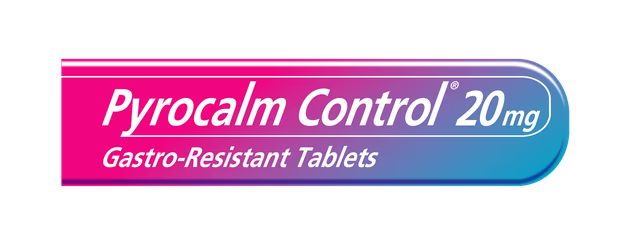
Heartburn at night: how to improve sleep quality with heartburn
Peer reviewed by Dr Krishna Vakharia, MRCGPLast updated by Amberley DavisLast updated 16 Jun 2023
One in 10 of us are affected by heartburn every day1, and it can be particularly bad at night. If heartburn frequently keeps you from getting a good night's sleep, medicines and adjustments to your evening routine may ease your discomfort. If this doesn't fully cure your heartburn at night, your doctor needs to investigate the underlying cause.
Sponsored
Pyocalm Control
Pyrocalm Control 20mg Gastro-Resistant Tablets (omeprazole) can be used for the treatment of reflux symptoms which include heartburn and acid reflux. Always read the label. The first branded omeprazole 20mg available over the counter for up to 24 hour confidence in heartburn control.
This article was funded by and created on behalf of Pyrocalm Control (Dexcel Pharma Ltd). Pyrocalm Control has provided input into the article content. It has been reviewed for medical accuracy and compliance with industry codes of practice. The Healthcare Professionals contributing to this article do not endorse any brands or medicines.

In this article:
Continue reading below
Heartburn symptoms
If you have heartburn, you'll feel a burning sensation in the top of your stomach or chest that travels up your neck. This is a symptom of acid reflux - where acid and food leaks from your stomach up into your throat, called your oesophagus. Despite the name, heartburn has nothing to do with your heart.
Heartburn may be common, but this doesn't mean you should ignore it if it keeps happening. Regular heartburn could mean that you have gastro-oesophageal reflux disease (GORD), a condition where the wall of muscle separating your stomach and oesophagus - called the lower oesophageal sphincter muscle - doesn't work properly. Occasionally, regular heartburn is a sign of something more serious.
What causes heartburn at night?
Heartburn keeps a lot of people up at night. In most cases, the reasons behind this are nothing to worry about and can be resolved by making a few changes at home. These slight changes can have a significant impact, because getting good quality sleep allows your body to repair and restore itself. As a result, sleep helps protect against several health conditions - from mental illness to heart disease and beyond.
Here's why heartburn may appear at night.
It's triggered by what you eat and/or how close to bedtime you eat in the evening - certain foods and drink increase your chances of heartburn and eating a lot too close to bedtime means your stomach is full as you lie down to sleep.
Lying down to sleep can make it easier for the contents of your stomach to leak out - without gravity helping to close the sphincter muscle between your oesophagus and stomach.
Foods that cause heartburn at night
As a rule, eating or drinking anything spicy, fatty, or acidic in the evening makes nighttime heartburn much more likely. But these aren't the only causes.
Common heartburn trigger foods include:
Citrus fruits - for example, lemons, grapefruits, and oranges.
Spicy foods - for example, chilli-based spices, sauces, and curries.
High-fat, greasy foods - for example, fried foods, fatty meat, and full-fat dairy.
Chocolate.
Tomatoes.
Onion.
Garlic.
Peppers.
Common heartburn trigger drinks:
Alcohol - particularly beverages with high acidity, such as ciders, cocktails, and wine.
Coffee, tea, and other caffeine-based drinks.
Fizzy drinks - for example, sparkling water and Coca-Cola.
Other causes of heartburn at night
It's not always about what and how late you eat. Heartburn at night may also be triggered by other lifestyle or medical factors, such as:
Experiencing high stress levels - can increase your stomach acid and aggravate acid reflux, heartburn, and GORD2.
Being overweight or obese - can increase pressure on your stomach or cause inflammation that damages your sphincter muscle3.
Taking certain medications - such as ibuprofen, aspirin, antibiotics, steroids, and some heart medicines. If you suspect your medication could be causing issues, don't stop taking it. Instead, ask your doctor's advice before making any changes.
Smoking - can affect your sphincter muscle and increase stomach acid and inflammation. Quitting has been shown to significantly reduce heartburn and other GORD symptoms in around half of cases after one year4.
Wearing tight fitting clothing - can place extra pressure on your midsection, forcing stomach acid to rise and escape.
Being pregnant - hormonal changes, stress, added pressure in your body, and weight gain during pregnancy can make you more vulnerable to heartburn. In fact, up to 45% of pregnant women experience heartburn5.
Having a hiatus hernia - is a condition where your stomach pushes up into your chest, making you more prone to acid reflux and heartburn.
Continue reading below
How to help get rid of heartburn at night
Several over-the-counter medicines can help relieve heartburn, allowing you to get a good night's rest. If you're pregnant, ask your doctor's advice first.
The two main groups are:
Antacids
These work by neutralising your stomach acid, which reduces the damage to your stomach and provides relief for both heartburn and indigestion that lasts a few hours. Ask your pharmacist for advice on what is best for you.
There are many different types available, these include:
Bismuth subsalicylate.
Calcium carbonate.
Magnesium hydroxide.
Sodium bicarbonate - found in baking soda, the common kitchen cupboard product.
Alginic acid - an extra ingredient that lines your stomach to prevent acid splashing up your throat.
Acid reducers
These decrease the production of acid in your stomach. There are two main types: Proton pump inhibitors (PPIs) are generally better at reducing stomach acid than histamine antagonists - also called H2 blockers. However, the latter are now prescription only and some have been taken off the market completely, for example ranitidine.
Types include:
Pantoprazole (a PPI).
Omeprazole (a PPI).
Esomeprazole (a PPI).
Famotidine (H2 blocker).
Nizatidine (H2 blocker).
Both antacids and acid reducers can relieve heartburn, and it may be a case of trial and error to find what works best for you. As with all medications, there's a small risk of side effects, which includes digestive disturbances such as diarrhoea, constipation, and stomach pain, and other symptoms like nausea, headache, and a sore throat.
These options are short-term treatments and shouldn't be used to manage an ongoing problem. If you experience heartburn at night for more than two consecutive weeks, see your doctor to find out the underlying cause and for stronger prescription medications.
How to improve sleep with heartburn
Heather Darwall-Smith is a psychotherapist and spokesperson for the UK Council for Psychotherapy (UKCP). She shares her tips for managing heartburn at night and improving your sleep.
Practice good sleep hygiene - establish a consistent sleep routine and avoid caffeine at least six hours before bedtime. Create a dark and quiet environment to promote quality sleep.
Elevate your head while sleeping - this can help reduce the amount of acid that flows back into your oesophagus. You can do this by using a wedge pillow or placing a few pillows under your head.
Avoid eating late at night - try to finish your dinner at least 2-3 hours before bedtime. This gives your stomach enough time to digest the food.
Avoid trigger foods - identify your trigger foods and avoid them at dinner and before bedtime.
Avoid or limit alcohol - if you are drinking, stop at least 2-3 hours before bedtime, as drinking late can disrupting the body’s natural sleep-wake cycle, leading to less restful sleep. Don't consume alcohol on an empty stomach, as this can increase the risk of heartburn, indigestion, and other digestive problems, which can interfere with sleep.
"Understanding your circadian rhythm - your internal body clock - can also help reduce heartburn and improve sleep," says Darwall-Smith. "Here are some ways you can use this knowledge."
Eat meals at regular times - this can help regulate your body's digestive processes and prevent digestive issues that can interfere with sleep. Aim to eat your last meal at least 2-3 hours before bedtime to allow time for digestion to slow down.
Avoid late-night snacking - this can disrupt your body's natural rhythm and interfere with sleep quality. It's best to avoid eating or drinking anything except water in the hours leading up to bedtime.
Limit caffeine - this can disrupt the circadian rhythm and interfere with sleep, so it’s best to avoid in the evening and close to bedtime.
Get plenty of natural light - exposure to natural light during the day can help regulate the circadian rhythm and promote better sleep at night. Try to get outside for at least 30 minutes each day and consider using bright light therapy if you can't get enough natural light.
Continue reading below
How to address the underlying problem
Medications for heartburn at night may feel like all you need, but a recurring heartburn problem - that's not going away after changing your diet, evening routine, and sleep hygiene habits - needs to be investigated by a doctor.
Heartburn is often a symptom of GORD and sometimes of a condition known as Barrett's oesophagus, where cells in your oesophagus act in an abnormal way. While these conditions are both manageable, they can occasionally lead to more serious problems - such as oesophageal cancer.
According to Heartburn Cancer UK6:
One in 10 people with heartburn unknowingly have Barrett's - that's around half a million people in the UK.
One in 10 of these people may go on to develop oesophageal cancer - that's around 50,000 people in the UK.
Some other underlying causes of heartburn - such as obesity, pregnancy, or a hiatus hernia - can be difficult to manage. It's important to find a more permanent solution by seeking support from a healthcare professional.
Further reading
Article History
The information on this page is written and peer reviewed by qualified clinicians.
16 Jun 2023 | Latest version
16 Jun 2023 | Originally published
Authored by:
Amberley Davis

Feeling unwell?
Assess your symptoms online for free